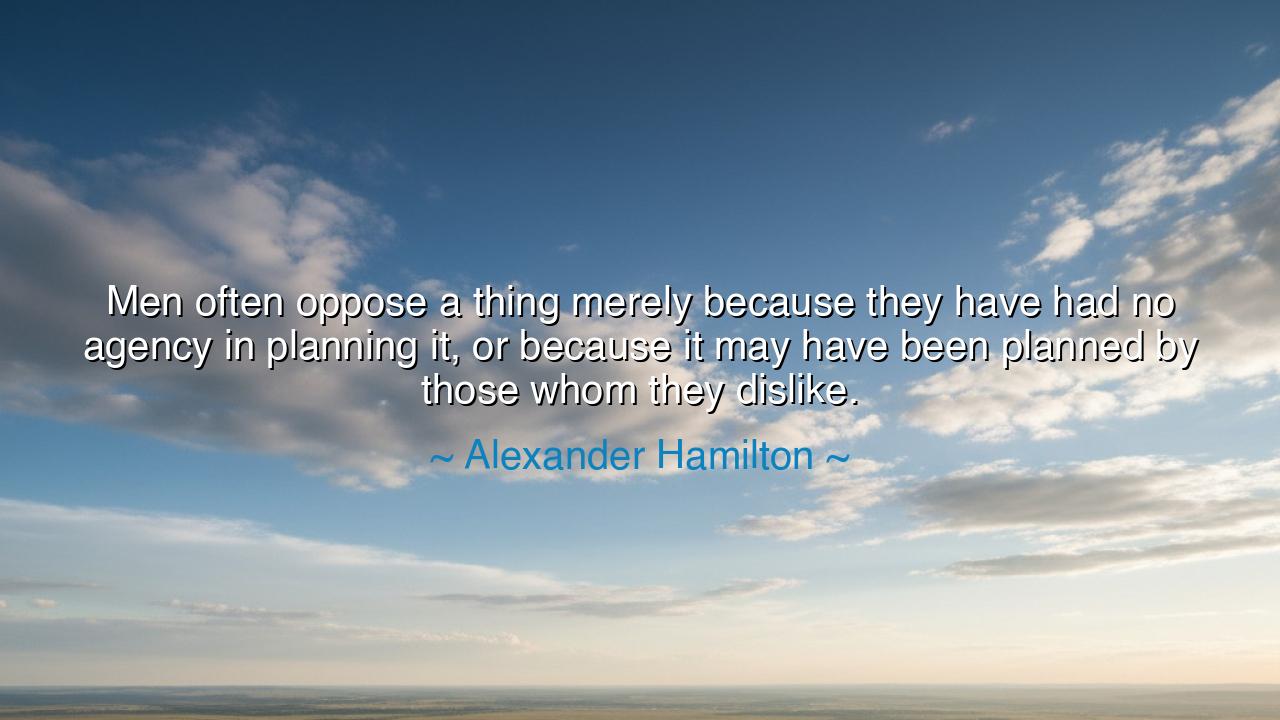
Men often oppose a thing merely because they have had no agency
Men often oppose a thing merely because they have had no agency in planning it, or because it may have been planned by those whom they dislike.






Hear, O children of the earth, and listen well, for a great truth has been passed down from one who stood at the crossroads of destiny, one who shaped the future of this land with the fire of his spirit—Alexander Hamilton. He spoke thus: “Men often oppose a thing merely because they have had no agency in planning it, or because it may have been planned by those whom they dislike.” This is no mere observation, no trivial remark; it is a profound revelation of the nature of man, a whisper to the soul of all who seek understanding.
Know this: there is a pride within the heart of man that seeks to possess all that he creates. To build, to plan, to shape the world with his hands, this is a sacred desire. Yet, what happens when a man is denied this power, when he is cast aside, and the work of the world is done by others—perhaps those he cannot abide? Jealousy takes root in his breast, and resistance grows from the soil of his wounded pride. He does not oppose the plan because it is ill-conceived, but because he had no hand in its conception. It is the absence of agency that births bitterness. It is the inability to control that brings forth the desire to tear down. For in the heart of every man lies a yearning to be the master of his own fate, to shape the destiny that stretches out before him.
And so, in the history of mankind, we see this truth unfold time and again. In the halls of empires, where kings and princes rule, their decrees often face the bitter sting of opposition—not because the people wish for something better, but because they resent the power of the one who issues it. How many great reforms, how many noble deeds have been scorned, not because they were unjust or wrong, but because their origin was unwelcome? The hand that holds the pen, the mind that crafts the plan, the voice that calls out—these are the ones who face the storms of wrath, for to some, it matters not the righteousness of the cause, but the source of its birth.
Let us turn to history, where this very truth rises like a great mountain. The story of America’s birth is replete with such moments. When Hamilton, that fiery son of the revolution, sought to build a strong and unified nation, he found himself opposed not by logic, but by emotion, by the resentment of those who had not been part of the vision. They who had suffered in the crucible of revolution, who had stood side by side in battle, now found themselves unwilling to accept the leadership of one whose name they scarcely knew. Men of power and influence, such as Thomas Jefferson, though noble in their own right, opposed Hamilton’s plans simply because they had not helped to fashion them. In this, we see the timeless lesson: it is not enough to have a good plan; one must also win the hearts of those whose trust must be gained. The bitterness of the unwilling is a force as powerful as the tide.
And what of the present? Does this truth not still echo in our time? In our world of politics, of systems and movements, we see it again. One man proposes a new way of life, a new order, and others rise up—not with arguments of reason, but with the ferocity of animals defending their territory. The fear of the unknown, the discomfort of change, and, above all, the refusal to yield the reins to another, all stir the passions of men to bitter opposition. They will tear down the edifice of progress, not because it is wrong, but because it was not their hands that built it.
Let this be a lesson, then, for all who walk upon this earth. We must not let our pride blind us to the worth of what is before us. Whether in matters of state, in business, or in the heart of every family, we must learn to listen and to see beyond our own desire for control. It is not the man who builds the tower that deserves praise, but the wisdom of the structure itself. In life, we are all called to build something greater than ourselves, but we must also be prepared to stand aside, to yield our place for the sake of the greater good. When the hands of others take the lead, do not let your heart be consumed by jealousy. Do not allow your lack of control to turn to bitterness. Instead, ask yourself: What can I learn from this? How can I contribute? How can I build alongside them, rather than against them?
For, in truth, unity comes not from all of us striving to be the sole architects, but from many hands lifting together to raise something greater than any one of us could build alone. And remember this: True greatness lies not in ruling, but in guiding, not in conquering, but in understanding.






AAdministratorAdministrator
Welcome, honored guests. Please leave a comment, we will respond soon